When suffering, be it in any form, pain, discomfort, stress, be it emotional due to a loss, or physical, due to any injury, temporarily ceases, that cessation which is an impermanent suspension from our trouble, is not happiness. The temporary feeling/emotion thus obtained by indulging in any activity or escaping the bounds of such a distressing reality is in fact, just, pleasure, which cannot solely exists and will always depend upon something else.
Matthieu Ricard, a molecular biologist turned Buddhist monk, described by scientists as “the happiest man alive,” brings quite a lot of clarity to this socially prevalent misunderstanding between these two concepts of happiness and pleasure, in his 20min TED Talk.
Pleasure is contingent upon time, upon its object, upon the place, it is something that changes of nature… it uses itself when you experience it.
For example, indulging in your most favorite, desired delicacy, which gives rise to this feeling exists only till your meal lasts. Now multiply, this experience by the vast variety of distractions or rather, attractions, that you let yourself be absorbed by, be it something you purchased recently, which is usually not because of a need but out of just a fleeting desire to own and experience that, only because you are habituated to the joy arising out of such impulsive and indulgent activities. That isn’t happiness. That is pleasure, a sensual gratification that lasts for that moment, and depends on the nature of that activity/thing.
The other bad side of pleasure –
[Pleasure] it is not something that is radiating outside. Like, you can feel intense pleasure and some others around you can be suffering a lot.
What happiness is not, and what it really is
[Happiness] is not just a mere pleasurable sensation. It is a deep sense of serenity and fulfillment, a state that actually pervades and underlies all emotional states, and all the joys and sorrows that can come one’s way.
Pleasure would be to spend the vacation visiting the different corners of the world, but happiness would be to spend those days contributing through selfless generosity, by dedicating our time to a certain cause, be it by doing something that will protect the environment or save a child’s life.
This is what set’s the two disparate feelings apart, the need for recognition, acceptance, approval, any sort of feedback. Pleasure demands such things whereas happiness doesn’t depend on them.
At the opposite, everyone knows deep within that an act of selfless generosity, if from the distance, without anyone knowing anything about it, we could save a child’s life, make someone happy. We don’t need the recognition. We don’t need any gratitude. Just the mere fact of doing that fills such a sense of adequation with our deep nature. And we would like to be like that all the time.
Our system of differentiating between happiness and pleasure/temporary high, has been defunct and mutated over time because of various social factors that influence our decisions and impact our personal life.
One major reason why this has been prevailing since time immemorial is that, the overwhelming sense of pleasure easily and instantly obtained by intermittent acts indulgence is far too greater and easily attainable, than the promise of a distant state of everlasting happiness which requires enough patience and virtue to cultivate.
We, subjugated by our daily lives, barely pay attention to such slight differences. We have, rather implicitly and unknowingly accepted this belief that happiness will knock on our doors once we have enough, and get what we are striving for and have attained our wrongly defined goals.
Next Post: The major downfall of happiness
-end-




































